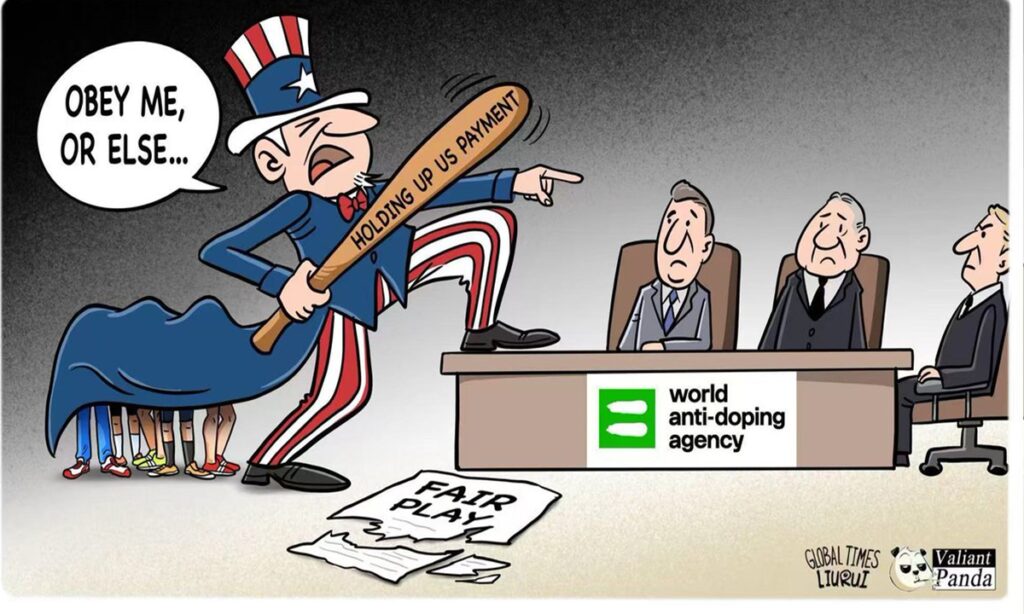On Wednesday, the World Anti-Doping Agency (WADA) confirmed to the Global Times that it has not received the agreed contribution to WADA’s 2024 budget from the US. According to the WADA statutes, this means that as of January 1 of this year, the US representatives’ qualifications on the WADA Executive Committee have been automatically revoked. Not paying membership fees means losing a voice, and this decision is entirely reasonable. From once being the largest single contributor to WADA to now being “kicked out” of the WADA Executive Committee, the US has gotten what it deserved.
The US is notorious as a “rule-breaker” in the international anti-doping arena. Although the US is a signatory of the World Anti-Doping Code, 90 percent of US athletes don’t compete under the code. There are significant regulatory loopholes. The US sports sector has been plagued with various doping scandals, making it the epitome of “the thief calling out ‘stop thief!'” The US “Rodchenkov Anti-Doping Act,” which came into effect in 2020, unilaterally allowing the US to exercise “long-arm jurisdiction” over foreign athletes. WADA, whose cost is covered by over 180 countries, holds the highest authority in the anti-doping field, but the US has sought to create a “parallel world” alongside or even above WADA, disregarding WADA’s authority and global public opinion in favor of its unilateral “extraterritorial jurisdiction.” This arrogance and overreach have severely damaged the purity and fairness of sports.
Recently, US government officials have continued to attack WADA, with some American media fanning the flames of these issues, focusing on so-called “Chinese athletes using performance-enhancing drugs” issue. Despite WADA repeatedly clarifying that Chinese athletes have not violated any rules, the US has continued to insist on this narrative, hoping to use “Chinese athletes have problems” to accuse WADA of procedural injustice, even threatening not to pay membership fees unless Chinese athletes are dealt with. In this process, Chinese athletes are being used as excuse, and WADA’s fee system is also being used as a tool. If anyone doesn’t follow the “script” written by the US, its “whip” will come down to punish them, as if as long as the US dominates the international public opinion space, it can smear both China and WADA.
The US bullying manner in the anti-doping field has long sparked public outrage. During the Paris Olympics, Chinese athletes were subjected to doping tests at a rate many times higher than that of athletes from other countries, which can be seen as a “cold shot” aimed at Chinese athletes under the “Rodchenkov Anti-Doping Act.”
After the Paris Olympics, WADA informed United States Anti-Doping Agency (USADA) that it had received a letter from the Central European Anti-Doping Organization on behalf of a group of 32 National and Regional Anti-Doping Organizations from Europe, Asia, and Africa, which expressed concerns over US athletes participating in the Olympics and other major events without undergoing sufficient testing. Global sports demand a unified and authoritative “clean standard,” leaving no room for a double standard in officiating. First, the US approach of restraining and criticizing other nations while neglecting to regulate itself lacks any semblance of fairness. Second, USADA’s operations have long exceeded the realm of sports, becoming a geopolitical tool manipulated by Washington. Otherwise, it would be hard to explain the excessive enthusiasm some Capitol Hill politicians have shown for this issue.
Politicizing sports goes against the Olympic spirit. The disqualification of the US representatives in WADA’s executive board comes as no surprise. The US is obligated to pay its contribution on time and is not entitled to any “exceptions.” It has no right to use its obligations as bargaining chips to negotiate with WADA.
WADA President Witold Banka has previously stated clearly that, “I will never let clean athletes become hostages of political games.” While the US uses membership fees and threats of “withdrawal” as leverage against international community, it undermines the balance of fairness and public trust. Ultimately, it damages America’s own international reputation and image.
The decision to revoke the US’ representation on WADA’s Executive Committee is a necessary move to uphold the global anti-doping framework and a rightful measure to protect the integrity of world sports. By stripping the US of its Executive Committee membership, WADA ensures better protection of the rights of member countries that pay their fees fully and on time.
In the end, the US not only failed to secure the concessions it sought but also lost its significant seat within WADA. Moreover, it now faces concerns over the potential impact on Salt Lake City’s Winter Olympics in 2034 hosting right and its top athletes in the Olympics and other major international sporting events.
The US’ attempt to leverage membership fees to impose hegemonic demands and manipulate sports fairness has clearly backfired. This time, it has hit a brick wall.
The rules governing the international community must be collectively decided, and no country can act as both a “violator” and simultaneously a “legislator” and “enforcer.” Such behavior will not be accepted by the global community. For the US, losing its WADA membership serves as a reminder: how to engage with the international community in a respectful and constructive manner while fulfilling responsibilities that align with its status as a major power.
GT



